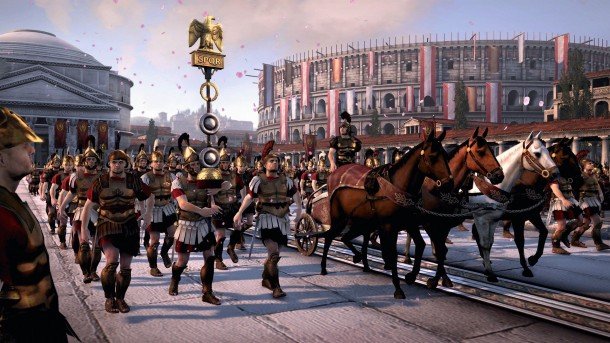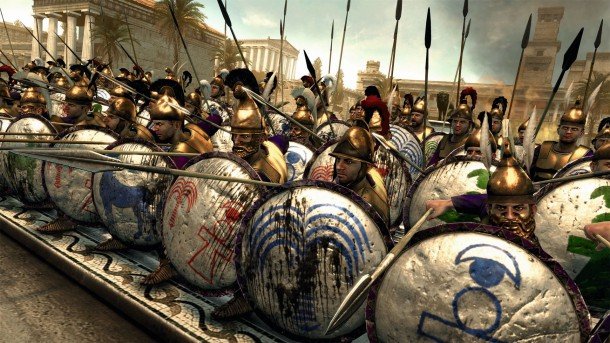Total War: Rome 2 preview - ambush and betrayal in the ancient world RTS

The battle of Teutoburg is a standalone scenario, but ambushes will be a part of the main campaign. It's now possible to set an army's stance to defensive, aggressive, or ambush. In the latter, you'll have the option to force a battle upon a passing enemy. They won't have a chance to deploy, and you'll have an opportunity to wipe them out before they can flee. Battlefield terrain, once generated, will now be persistent within an area on the campaign map – so if you've found a rocky mountain pass that you like to use for ambushes, you can keep returning to use it for as long as enemies are willing to walk into your clutches. Combined with the line-of-sight system, this has the potential to make the non-Roman factions genuinely more interesting to play: the Germans might not have the same technology and discipline, but familiarity with their environment could win them some decisive victories. As in life.
"Deeds will be remembered, and the hatred towards the player will build."
Ambushes are also a great way for allies to announce that they're no longer interested in being friends with you – something that Rome II's campaign designers anticipate will happen frequently.
“Sometimes we've had people internally say that alliance behaviour is broken – 'my ally attacked me!'” lead designer James Russell says. “Sometimes, though, that's because the AI has decided that friendship doesn't fit with its plans.”
I've still not seen the revamped campaign map, but talking to its lead designers reveals some of the thinking behind the changes in store. In particular, Creative Assembly are looking to address problems with the clean-up phase that can bog down the endgame of a Total War campaign. Shogun 2's realm-divide mechanic – where the other factions turned on the player when their empire reached a certain critical mass – was, appropriately enough, divisive. In Rome II, it's still likely that the player will face increased opposition as they grow in power, but it'll happen gradually, and you'll have a chance to anticipate it.
“The new system remembers facts,” is how lead campaign designer Janos Gaspar explains it to me. “Deeds will be remembered, and the hatred towards the player will build. As you're bumping into new powers, the friends of your enemies are getting hostile. A power vacuum can form around you, new empires can appear.”

This is linked to the other major change: political dynasties. In addition to choosing your faction, you also pick which family, tribe or power base you represent within it. The first Rome game split the Republic into three separate factions: Rome II presents the same idea in a much more subtle way, and expands it across every culture.
“We didn't want the player to feel like they weren't controlling Rome,” campaign designer Dom Starr says. “They are Rome – just part of a political dynasty.”
Keep up to date with the most important stories and the best deals, as picked by the PC Gamer team.
"Over a long enough stretch of time, betrayal and civil war is inevitable. Or to put it another way, someone is going to cross the Rubicon."
You'll have internal rivals to contend with, and your relationship with these – based on a substantially expanded version of Shogun 2's loyalty system – will have a major influence on your decision-making. Over a long enough stretch of time, betrayal and civil war is inevitable. Or, to put it another way: someone is going to cross the Rubicon.
“[Rivals] will still try to achieve their goals, but if everything goes right, you won't fight them,” Gaspar says. “It's more like personal differences. Later on, it could lead to a break or a rupture.”
This, then, is the final way in which the precedents set by the Teutoburg scenario feed into the campaign as a whole. When betrayal is nigh-inevitable, the freedom to make choices – where to fight, who to trust – is essential. As well as representing Varus's actions literally, Creative Assembly want to give the player freedom to dig a similar hole for themselves. “The more reversible a decision is, the less of a decision it was,” is how Russell puts it. “If a decision has no consequence, it wasn't really a decision.”
Joining in 2011, Chris made his start with PC Gamer turning beautiful trees into magazines, first as a writer and later as deputy editor. Once PCG's reluctant MMO champion , his discovery of Dota 2 in 2012 led him to much darker, stranger places. In 2015, Chris became the editor of PC Gamer Pro, overseeing our online coverage of competitive gaming and esports. He left in 2017, and can be now found making games and recording the Crate & Crowbar podcast.


